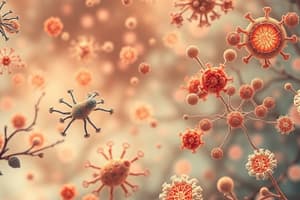Podcast
Questions and Answers
Which major histocompatibility complex (MHC) class is recognized by CD8+ T cells?
Which major histocompatibility complex (MHC) class is recognized by CD8+ T cells?
- MHC Class II
- MHC Class I (correct)
- MHC Class IV
- MHC Class III
Which type of hypersensitivity reaction is primarily mediated by antigen-antibody complexes?
Which type of hypersensitivity reaction is primarily mediated by antigen-antibody complexes?
- Type II
- Type III (correct)
- Type IV
- Type I
What is a consequence of the hygiene hypothesis regarding immune responses?
What is a consequence of the hygiene hypothesis regarding immune responses?
- Decreased allergic reactions
- Increased autoimmune and allergic diseases (correct)
- Enhanced autoimmune response
- Increased susceptibility to infections
Which factor stabilizes C3b in the alternative pathway of complement activation?
Which factor stabilizes C3b in the alternative pathway of complement activation?
Which type of immune cell is primarily responsible for histamine release during inflammation?
Which type of immune cell is primarily responsible for histamine release during inflammation?
What is the primary role of T regulatory (TREG) cells in the immune system?
What is the primary role of T regulatory (TREG) cells in the immune system?
Which cytokine is essential for the differentiation of TH17 cells?
Which cytokine is essential for the differentiation of TH17 cells?
What is the most recognizable characteristic of adaptive immunity?
What is the most recognizable characteristic of adaptive immunity?
Which of the following is responsible for presenting intracellular antigens to CD8+ T cells?
Which of the following is responsible for presenting intracellular antigens to CD8+ T cells?
Which antibody isotype is most effective in activating the classical complement pathway?
Which antibody isotype is most effective in activating the classical complement pathway?
Which of the following cell types is primarily responsible for antibody production?
Which of the following cell types is primarily responsible for antibody production?
What is the critical cytokine for macrophage activation in a TH1 response?
What is the critical cytokine for macrophage activation in a TH1 response?
Which process is characterized by the formation of granulomas?
Which process is characterized by the formation of granulomas?
What is the function of the membrane attack complex (MAC) in the immune response?
What is the function of the membrane attack complex (MAC) in the immune response?
Which enzyme is essential for the V(D)J recombination process in lymphocytes?
Which enzyme is essential for the V(D)J recombination process in lymphocytes?
Which T cell subset is primarily involved in fighting allergies and parasitic infections?
Which T cell subset is primarily involved in fighting allergies and parasitic infections?
Flashcards
What is the thymus?
What is the thymus?
A primary lymphoid organ where T cells mature and learn to differentiate between self and non-self antigens.
What is the role of IgE?
What is the role of IgE?
A type of antibody that binds to mast cells and basophils, triggering the release of histamine and other inflammatory mediators in Type I hypersensitivity reactions, such as allergies.
What is the role of a dendritic cell?
What is the role of a dendritic cell?
A specialized cell in the immune system that presents processed antigens to T cells, crucial for initiating adaptive immune responses.
What is affinity maturation?
What is affinity maturation?
Signup and view all the flashcards
What is the membrane attack complex (MAC)?
What is the membrane attack complex (MAC)?
Signup and view all the flashcards
What is phagocytosis?
What is phagocytosis?
Signup and view all the flashcards
What is recombinase (RAG1/2)?
What is recombinase (RAG1/2)?
Signup and view all the flashcards
What is the spleen?
What is the spleen?
Signup and view all the flashcards
What do CD8+ T cells recognize?
What do CD8+ T cells recognize?
Signup and view all the flashcards
What type of hypersensitivity is mediated by immune complexes?
What type of hypersensitivity is mediated by immune complexes?
Signup and view all the flashcards
What does the hygiene hypothesis suggest?
What does the hygiene hypothesis suggest?
Signup and view all the flashcards
What stabilizes C3b in the alternative pathway?
What stabilizes C3b in the alternative pathway?
Signup and view all the flashcards
What cell produces histamine?
What cell produces histamine?
Signup and view all the flashcards
What is the role of Treg cells?
What is the role of Treg cells?
Signup and view all the flashcards
What is the target of the MAC?
What is the target of the MAC?
Signup and view all the flashcards
What cytokine drives TH17 differentiation?
What cytokine drives TH17 differentiation?
Signup and view all the flashcards
Study Notes
Immunological Concepts: MCQ Study Notes
-
Primary Lymphoid Organs: The thymus is a primary lymphoid organ.
-
Complement Activation and Antibodies: IgM is the most effective antibody isotype for activating the classical complement pathway.
-
MHC Class I Function: MHC Class I molecules present intracellular antigens to CD8+ T cells.
-
Affinity Maturation Location: Affinity maturation occurs in the germinal centers of lymph nodes.
-
Antibody Production: Plasma cells are the primary antibody-producing cells.
-
Alternative Complement Pathway Initiation: C3 is the first complement protein activated in the alternative pathway.
-
Membrane Attack Complex (MAC) Function: The MAC creates pores in pathogen membranes.
-
Macrophage Activation and Cytokines: IFN-γ is critical for activating macrophages in a TH1 response.
-
Chronic Inflammation Characteristic: Granuloma formation characterizes chronic inflammation.
-
Type I Hypersensitivity Mediators: IgE and mast cells mediate Type I hypersensitivity.
-
V(D)J Recombination Enzyme: Recombinase (RAG1/2) is the enzyme responsible for V(D)J recombination in B and T cells.
-
Secondary Lymphoid Organs: The spleen is a secondary lymphoid organ.
-
Dendritic Cell Role: Dendritic cells are crucial for presenting antigens to T cells.
-
Classical Complement Pathway Regulation: C1 inhibitor (C1-INH) regulates the classical complement pathway.
-
TH2 Cells and Immune Responses: TH2 cells are involved in allergies and parasitic infections.
-
CD8+ T Cell Recognition: CD8+ T cells recognize MHC Class I molecules on target cells.
-
Type III Hypersensitivity: Immune complexes mediate Type III hypersensitivity.
-
Hygiene Hypothesis: Reduced pathogen exposure is associated with increased autoimmune and allergic diseases.
-
Alternative Pathway C3b Stabilization: Properdin stabilizes C3b on pathogen surfaces in the alternative pathway.
-
Histamine Production: Mast cells produce histamine during inflammation.
-
T Regulatory (TREG) Cell Function: TREG cells suppress immune responses.
-
MAC Target: The MAC targets the lipid bilayers of pathogens .
-
TH17 Cell Differentiation: IL-23 drives the differentiation of TH17 cells.
-
Adaptive Immunity Key Feature: Immunological memory is the defining feature of adaptive immunity.
-
Antibody-Dependent Classical Pathway: The classical pathway requires antibodies for initiation.
-
Acute Phase Proteins: Acute-phase proteins enhance phagocytosis and inflammation.
-
Acute Inflammation First Responders: Neutrophils are the first immune cells to arrive during acute inflammation.
-
IL-2 Function: IL-2 promotes T cell proliferation and growth.
-
MHC Class II Antigen Processing: The endocytic pathway, involving lysosomal degradation of extracellular antigens, is part of MHC Class II antigen processing.
-
Rheumatoid Arthritis Marker: Rheumatoid factor (RF) is associated with rheumatoid arthritis.
Studying That Suits You
Use AI to generate personalized quizzes and flashcards to suit your learning preferences.




